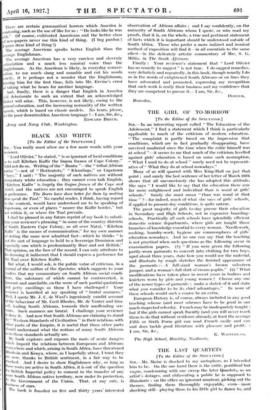THE GIRL OF TO-MORROW [To the Editor of the SPECTATOR.]
SIR,—In an interesting report called " The Education of the Adolescent," I find a statement which I think is particularly applicable to much of the criticism of modern education. " The complaint is partly based on the impression that conditions, which are in fact gradually disappearing, have survived unaltered since the time when the critic himself was at school "—it seems to me that much of the criticism levelled against girls' education is based on some such assumption. " What I used to do at school " surely need not be represent- ative of " What they do at school nowadays."
Many of us will quarrel with Miss King-Hall on just that point ; and surely the last sentence of her letter of March 26th shows that all unconsciously she has adopted this attitude. She says " I would like to say that the education there was far more enlightened and individual than is usual at girls' schools." Surely she must mean " than was usual at that time " ?—for indeed, much of what she says of girls' schools, if applied to present-day conditions, is quite untrue.
The great majority of girls to-day pursue their education in Secondary and High Schools, not in expensive boarding- schools. Practically all such schools have splendidly efficient domestic science departments, where girls arc taught those branches of knowledge essential to every woman. Needlework, cooking, laundry-work, hygiene are commonplaces of girls' education nowadays. And no one can say that the teaching is not practical when such questions as the following occur in examination papers. (1) " If you were given the following partly-worn garments to convert into clothing for two boys, aged about three years, state how you would use the material, and illustrate by rough sketches the finished appearance of the garments :—A full-sized woman's brown velveteen jumper, and a woman's full skirt of cream poplin." (2) "What modifications have taken place in recent years in bodices and knickers worn by girls and young women ? Choose any one of the newer types of garments ; make a sketch of it and state what you consider to be its chief advantages." In none of these schools would such a course be an extra.
European History is, of course, always included in any good teaching scheme (and most schemes have to be good in our much-inspected schools). French may be inadequately taught ; but if the girls cannot speak fluently (and you will never teach them to do that without residence abroad), at least the average Fifth or Sixth Form girl can read French easily and can and does tackle good literature with pleasure and profit. I am, Sir, &c., The High School, Brackley, Nodhauts.


































 Previous page
Previous page